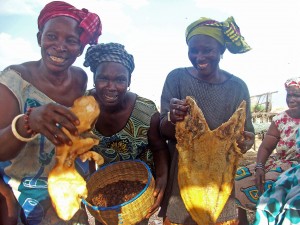Women play a very important role in the artisanal fisheries sector of Senegal, where at least 7,000 work as wholesale fish traders and processors. Yet, while these women make a vital contribution to the welfare of their families as well as to the economic development of their country, their ability to effect change in the field of their employment is seriously impeded by persistent gender- and culture-related obstacles. As a result, women are vastly under-represented (less than five percent) in fisheries governing bodies and cannot fully play their part in the development of fisheries in Senegal.
To help overcome some of the obstacles towards fair representation and active participation of women in the fisheries sector, the USAID/COMFISH Collaborative Management for a Sustainable Fisheries Future in Senegal Project, managed by CRC, organized a workshop to analyze the conditions and situations for women working in the fisheries sector in Senegal. This event brought together 42 women representing key women’s fish processing associations from seven major fishing communities and landing sites in Senegal (Joal, Mbour, Sindia, Rufisque, Yenne, Foundiougne and Cayar).
The gathering tested gender-sensitive workshop techniques for improving women’s participation. These included the use of the main local language (Wolof) to bridge the linguistic barrier between men and women, most of whom are largely illiterate. In addition, women were given front-row seats alongside men. And provisions were made to ensure equal talking time for both men and women. Finally, non-Western forms of communication (local songs, dances, stories and myths) were used to create familiar cultural settings conducive to women’s free expression and active participation.
This novel approach was subsequently tested at community gatherings as well as in more formal meetings, such as the recent follow-up national Gender and Fisheries Workshop organized by the Project in collaboration with the Fisheries Ministry and World Wildlife Fund. It has proven to be successful: “In the recent past, we were sidelined at community fisheries meetings and could hardly make our voices heard. With the current setup introduced by the Project, we feel more comfortable voicing our concerns,” said Maty NDAO, a representative of a fish processing women’s group in Cayar.
The follow-up workshop resulted in the formulation of a Women’s Declaration, the first, ever of its kind in the fisheries sector. An excerpt reads:“We, women working in the fisheries sector, are determined to sustainably develop the fisheries sector and to be a significant leverage to wealth creation in Senegal; we call on the Senegalese Government, the International Community and non-State actors to support this national initiative to reinforce women’s roles in the fisheries sector.”
Women fish processors in Cayar, Senegal
It also resulted in the crafting of a strategy and action plan to achieve the goals of the declaration. The strategy integrates the empowerment of women and the mainstreaming of their interests, concerns and values into fisheries management and policies. It was handed over to the Senegalese Fisheries authorities, who have approved it and pledged to act on its recommendations. The USAID/COMFISH project and its partners will promote and disseminate the national strategy among fishing communities, associations and other stakeholders while supporting women to lobby for the restructuring of CLPAs (Local Counsels of Artisanal Fisheries). For instance, in Joal — the biggest landing site in the country — only one woman out of 33 counselors sits on the Joal-Fadiouth CLPA. Gender-balanced CLPAs, in which women have a veto right against gender-biased decision making, could play a stronger role in the sustainable management of fisheries in Senegal.



